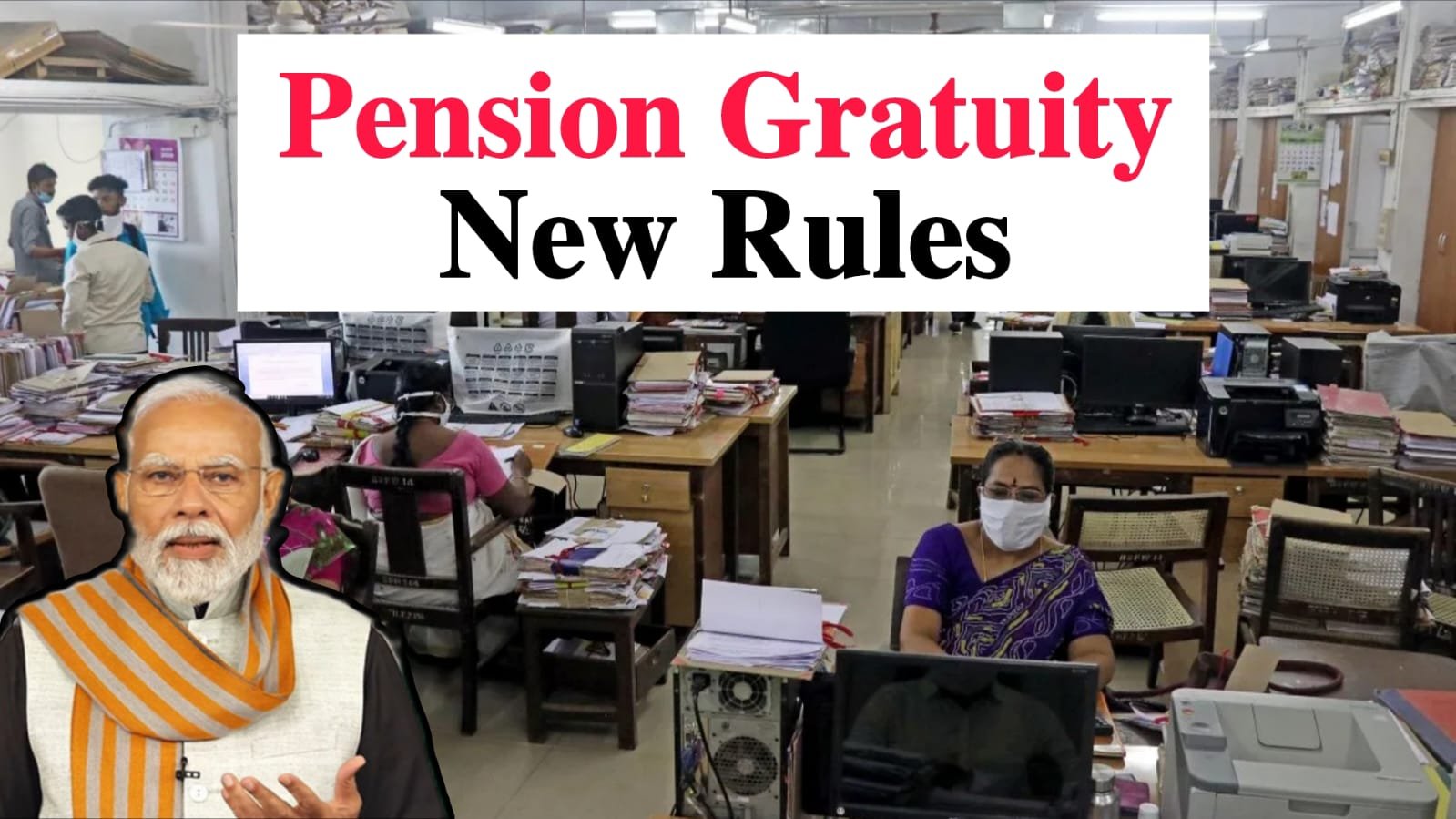Pension Gratuity New Rules : In a recent development that has sent shockwaves through the central government workforce, the Government of India has issued a new directive regarding pension and gratuity benefits. These changes could significantly impact the financial future of many government employees, especially those nearing retirement. Let us understand in detail what this new order entails and how it could affect lakhs of employees across the country.
Pension Gratuity New Rules : Pension and Gratuity: Lifeline for Retired Employees
For decades, pension and gratuity have served as pillars of financial security for government employees. These benefits not only support retirees during their old age but also provide assurance to their families. Pension ensures a continuous stream of income post-retirement, while gratuity offers a lump sum payment as a token of appreciation for years of service. However, recent government directives may now restrict access to these benefits under certain conditions.
Pension Gratuity New Rules : The New Government Order: What Has Changed?
According to the new guidelines issued by the central government, not all government employees will be eligible to receive pension and gratuity benefits. The government has made it clear that employees who are found guilty of misconduct, negligence, or any form of criminal activity during their service tenure may have their pension and gratuity withheld—either partially or in full.
This is a significant departure from the earlier system, where almost every central government employee was assured of receiving these post-retirement benefits, regardless of minor service issues. The new rules aim to promote greater accountability, discipline, and ethical conduct among government personnel.
Pension Gratuity New Rules : Who Will Be Affected?
The order clearly states that only those employees who are found guilty of serious misconduct—either through departmental proceedings or judicial actions—will face the withholding of their benefits. These include:
-
Employees who exhibit gross negligence in their duties
-
Those involved in corruption, fraud, or criminal offenses
-
Individuals who violate service rules or bring disrepute to the department
While this may not affect the entire government workforce, it certainly raises concerns, especially among those employees who are currently under investigation or facing departmental inquiries.
Pension Gratuity New Rules : Authority to Withhold Pension and Gratuity
The new directive gives powers to the appointing authority—generally the head of the department or ministry—to take decisions regarding the withholding of pension and gratuity. The President of India, as the supreme authority in central services, also retains the right to approve such actions. Additionally, departmental secretaries and other designated senior officers have been authorized to initiate action in such cases.
This means the final call on withholding or releasing the retirement benefits lies with the senior-most officials of the employee’s respective ministry or department.
How the Action Will Be Taken
According to the new rules, if a government employee is found guilty of misconduct during their tenure, the departmental head is required to notify the nominated officer regarding the issue. This officer will then escalate the matter to the appropriate higher authorities. After careful examination of the case and due consultation, the decision to withhold pension or gratuity will be taken.
Notably, before any final action is taken, the Union Public Service Commission (UPSC) must be consulted. The UPSC will review the case and provide its opinion on whether the benefits should be withheld or not. This ensures that no action is taken arbitrarily and that the rights of employees are protected.
Scope for Recovery of Paid Benefits
An important aspect of the new order is the recovery clause. If a government employee has already received pension or gratuity, but is later found guilty of misconduct or criminal activity during their service, the government can initiate recovery proceedings. This means the amount already paid may be reclaimed by the government, further increasing financial risk for the employee.
This clause also applies to contractual or temporary employees, who were previously not considered under such strict scrutiny. With this, the government is sending a strong message that accountability applies across all forms of employment under central administration.
Minimum Pension Will Not Be Affected
There is, however, a crucial exemption. Employees who are entitled to the minimum pension of ₹9,000 per month will not be affected by these new orders. This has been done to safeguard the financial interests of lower-income retired employees, who depend solely on their pension for survival.
This exemption ensures that the most vulnerable segment of the retired workforce is protected and continues to receive financial support, even if disciplinary actions are taken.
Purpose of the New Directive
The central government has justified this move as a step toward improving discipline, work ethics, and service accountability among government personnel. Officials believe that pension and gratuity should not be treated as unconditional entitlements but rather as rewards for honest and responsible service.
By introducing the possibility of withholding these benefits, the government aims to deter employees from indulging in unethical behavior or negligence. This aligns with the larger objective of building a more transparent and efficient bureaucracy.
Employee Reactions and Concerns
Unsurprisingly, this new directive has caused widespread concern among central government employees. Many unions and employee associations have voiced their opposition, stating that this policy may lead to unnecessary stress and fear among staff members. There are also concerns that it could be misused by higher authorities to settle personal scores or suppress dissent.
Employee representatives have urged the government to ensure fair implementation of these rules and to provide adequate safeguards to prevent misuse. They have also demanded clear guidelines on what constitutes “misconduct” or “negligence” to avoid ambiguity.
Conclusion
The new government order regarding the withholding of pension and gratuity is a major policy shift that emphasizes performance, discipline, and ethical conduct in the public sector. While the intent is to foster greater responsibility among employees, it also raises valid concerns about due process and protection of employee rights.
For current and future central government employees, this order serves as a reminder that post-retirement benefits are not automatic, but conditional upon their conduct throughout their service. Transparency in implementation, regular audits, and strong checks and balances will be essential to ensure that this policy achieves its intended goals without becoming a tool for arbitrary punishment.



